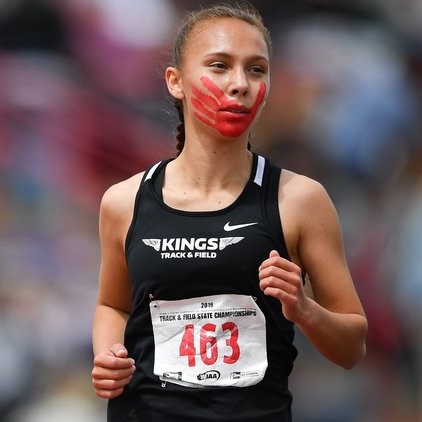
In the U.S., violence against Indigenous women has reached unprecedented levels. According to the Indian Law Resource Center, more than 80% of Alaska Native and American Indian (AN/AI) women have experienced violence, and more than 50% have experienced sexual violence. Alaska Native women continue to suffer the highest rate of forcible sexual assault and have reported rates of domestic violence up to 10 times higher than in the rest of the U.S.
More than 5,700 AN/AI women and girls were reported missing as of 2016, according to the National Crime Information Center, but only 116 cases were logged in the federal missing persons database. A 2008 study found that women in some tribal communities are 10 times more likely to be murdered than the national average.
Though violence against Indigenous women is a long-standing issue, it has recently garnered increased attention. In May, at the Washington Interscholastic Athletic Association State Track and Field Championship meet, Muckleshoot Tribal Schools student Rosalie Fish (Cowlitz Indian Tribe) received three gold medals, a silver and a sportsmanship award. But the high-school senior from Auburn, Wash., stood out for other reasons as well—at each of her events over the course of the three-day meet, she competed with a handprint of bright red paint over her mouth and the letters “MMIW” (Missing and Murdered Indigenous Women) on her right leg.
“I had a lot of people ask me, ‘Aren’t you happy to be state champion?’ Suddenly, my state meet felt insignificant compared to what I was running for,” Fish told The Spokesman-Review newspaper.
Others, including the Alaska Native Justice Center, are also working to raise awareness and advocate for change. For example:
- In January, the topic of missing and murdered Indigenous women was at the forefront of the Women’s March in Juneau, Alaska.
- In April, the U.S. House of Representatives voted to pass the Violence Against Women Reauthorization Act of 2019 (H.R. 1585), which includes special new protections for AN/AI women, after which the bill went to the Senate for consideration.
- In Alaska, nonpartisan advocacy group No More Free Passes is seeking to end the state’s crisis of sexual violence by lobbying for policy change, holding leaders accountable and making sexual assault a voting issue.
- Over two seasons, Canadian Broadcast Corp.’s “Missing and Murdered” podcast has shined a light on the endemic violence against Canada’s Indigenous women and girls. Both the podcast and its lead investigative reporter, Connie Walker (Okanese First Nation), received awards from the Canadian Journalism Foundation in June.
For more information, visit the following links:
- R. 1585: www.congress.gov (in the search bar at the top, select “Current Legislation” and type in “hr1585”)
- No More Free Passes: www.nomorefreepasses.org
- “Missing and Murdered” podcast: www.cbc.ca/mediacentre/program/missing-and-murdered
- National Indigenous Women’s Resource Center: niwrc.org/resource-topic/missing-and-murdered-native-women



